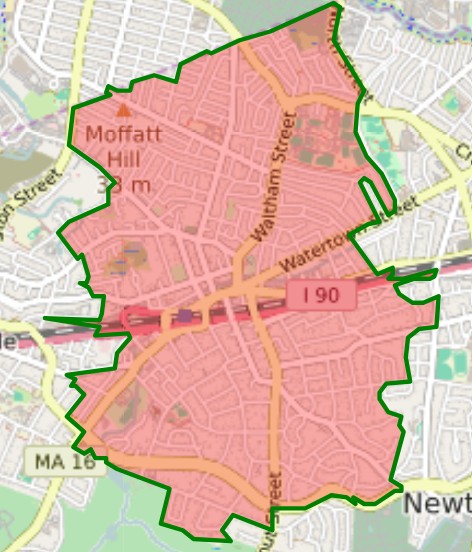Brief History
West Newton is among the oldest villages of Newton. The roadway that would become Washington Street in the village was laid out in the 1690s as European settlers colonized the area. This road connected Boston to Natick and so although West Newton at the time was a sleepy farm area, it became a stop along the way.
By the mid-1800s, the arrival of the railroad (the Boston & Worcester Railroad stop in 1834) made West Newton a desirable commuter-village for Boston-based professionals.
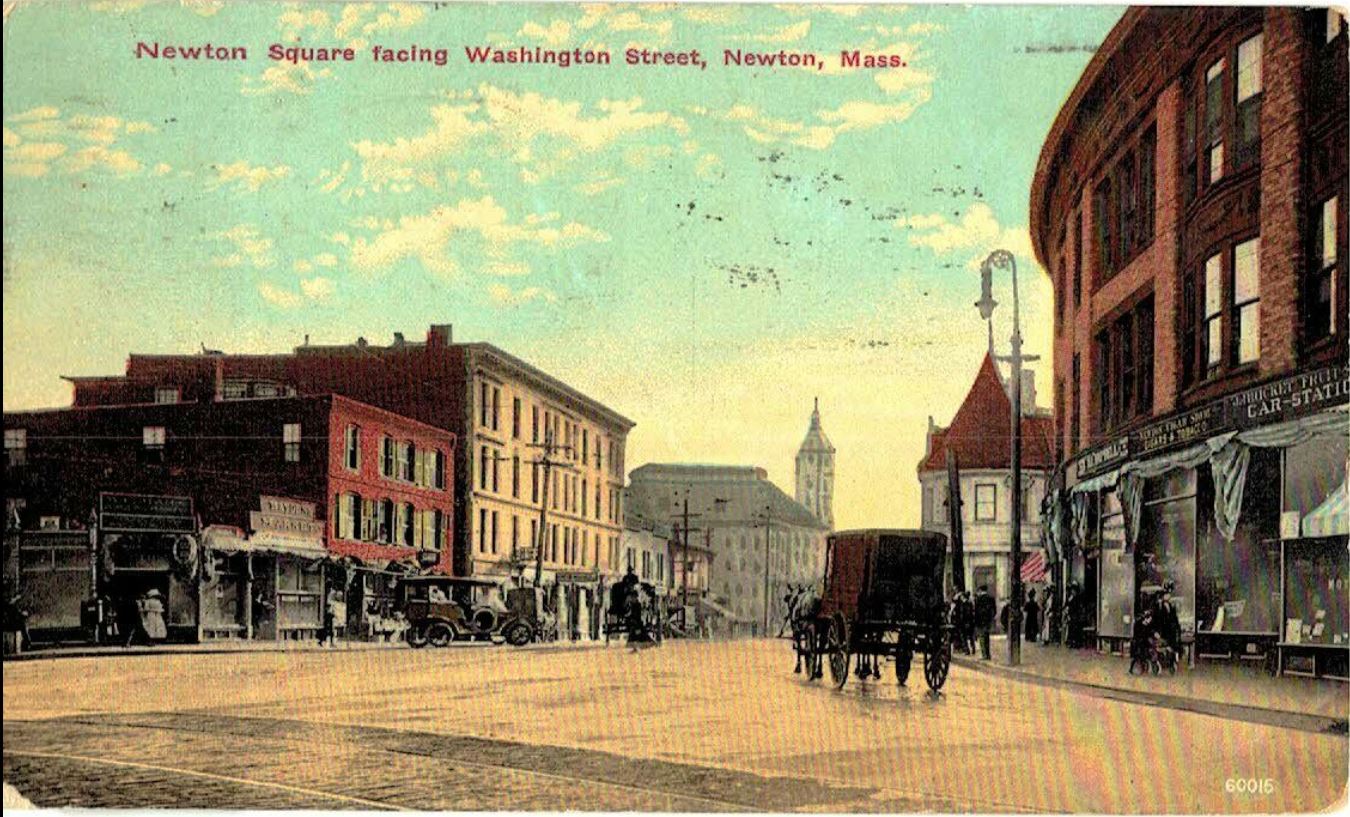 In the 1800s Newton had a robust African American community that resides mainly in the Curve St area and attended the Myrtle Baptist Church built in 1875. In the early 1960s, the chosen route for the Boston extension of the Massachusetts Turnpike bisected the Myrtle Baptist neighborhood, destroying homes and businesses and displacing families. Some continued to worship at Myrtle Baptist despite moving out of Newton, and the devastation of the neighborhood catalyzed residents, some descended from the original entrepreneurs, workers, and property owners, to form the Newton Fair Housing Committee in the 1960s.
In the 1800s Newton had a robust African American community that resides mainly in the Curve St area and attended the Myrtle Baptist Church built in 1875. In the early 1960s, the chosen route for the Boston extension of the Massachusetts Turnpike bisected the Myrtle Baptist neighborhood, destroying homes and businesses and displacing families. Some continued to worship at Myrtle Baptist despite moving out of Newton, and the devastation of the neighborhood catalyzed residents, some descended from the original entrepreneurs, workers, and property owners, to form the Newton Fair Housing Committee in the 1960s.
The West Newton Village Center Historic District (and adjacent West Newton Hill District) preserve many of the 19th- and early-20th-century architectural styles (Second Empire, Italianate, Queen Anne, Colonial Revival) that echo the village’s evolution from rural farmland to suburban enclave.
Village Character & Lifestyle
West Newton is an interesting mix of grand homes on West Newton Hill and other neighborhoods of West Newton, mixed in with humble homes built by railroad workers, and mid-century neighborhoods built in the 20th century as well as commercial areas. West Newton blends classic New England village charm with urban-adjacent convenience and has a larger, more vibrant center than most other villages. West Newton is home to the Police Station and Court House which are located on Washington St. West Newton also includes:
-
A walkable village center along Washington Street lined with local shops, restaurants, cafés and even an historic movie theater — making it easy to live without always needing a car for errands or social outings.
-
Architectural variety: Historic grand homes on West Newton Hill, more modest housing near the station, where may railroad workers lives and some newer infill — giving a mix of styles and price points.
-
A strong sense of community: Because the village balances proximity to Boston with suburban green spaces and tranquility, it appeals to families, professionals, and downsizers alike.
-
Transit-oriented lifestyle: With the commuter rail station in the village (see “Location & Commute” below), many residents commute into Boston or enjoy easy regional access — a lifestyle draw.
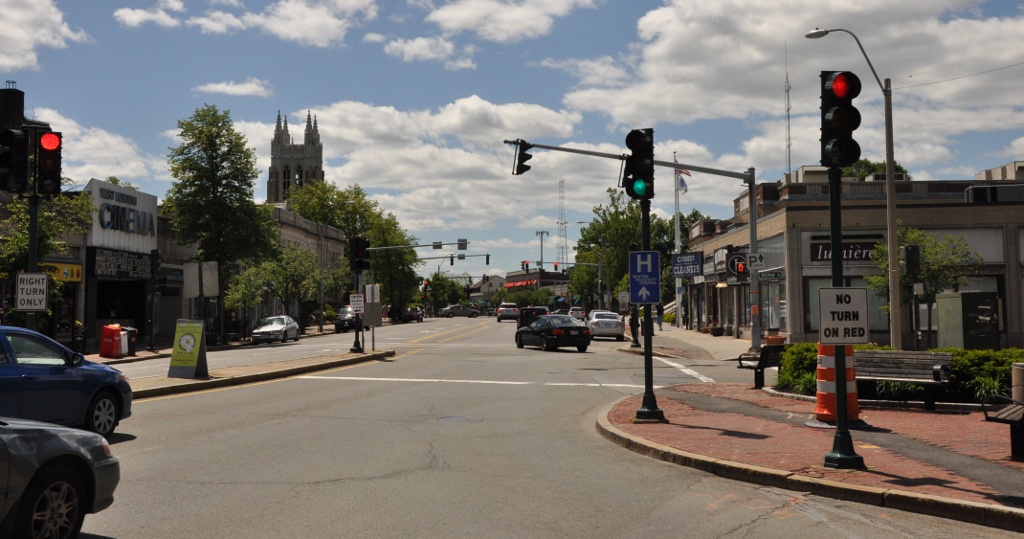
Schools & Community
West Newton students attend either the Peirce or Franklin Elementary schools, Day Middle School and Newton North High School.
-
Strong local public-school performance across Newton (which benefits the West Newton catchment as part of the broader district).
-
Engaged community groups in West Newton (for example historic preservation societies, local business associations) which reflect active, invested residents — something many buyers look for when choosing a home.
-
Many longtime residents plus newer families moving in, which tends to create stability in neighborhood culture and support networks.
Location & Commute
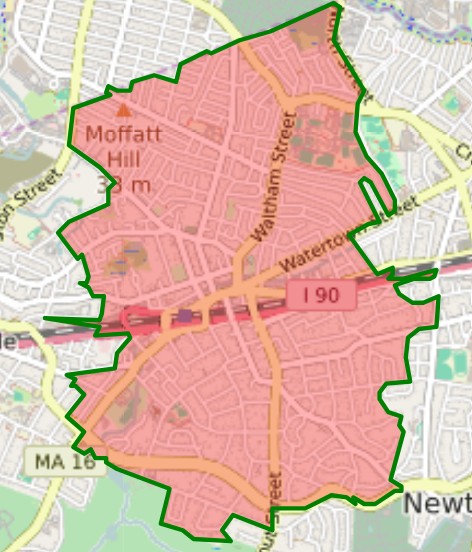
West Newton is on the North side of Newton (zipcode 02465), between Auburndale and Newtonville and adjacent to Waban and Waltham. In the 1960s, West Newton was divided by the Mass Pike and some history of West Newton was lost in the process.
-
The village has its own commuter-rail station: the West Newton station on the MBTA Framingham/Worcester line — providing direct service into Boston.
-
For drivers, Washington Street (Route 16) and easy access to Route 90 make access into Boston, Cambridge and other employment hubs relatively straightforward.
- West Newton is also served by express buses 505, 553, 554 that provide service to Boston and Waltham.
Parks & Sites of Interest
West Newton offers both historic and natural-amenity value.
Architectural landmarks: e.g., the Nathaniel Topliff Allen Homestead (c. 1848–52) on Webster Street — built by educator/abolitionist Nat Allen, recently renovated and now home to the Newton Cultural Alliance.
Nearby green spaces and trails: While West Newton is more built-out than some of Newton’s more rural villages, its location still offers access to nearby parks, tree-lined streets and the appeal of older lots with mature landscaping. Captain Ryan park, adjacent to the Police station hosts events geared to families. And the West Newton Commons on Webster St is a great space for kids to play.
Village center amenities: cafés, independent shops, restaurants and community businesses add to the desirability of living here.
West Newton is also home to Police headquarters, the Court House (on Washington St) and the Recycling Depot (on Rumford Ave) as well as the Newton Cultural Alliance (on Webster St)and the Chinese Community Center (on Elm St)
Home to one of the 3 original cemeteries in Newton – The West Parish Burying Ground or River Street Cemetery at the corner of Cherry and River streets in West Newton dates from 1781. This cemetery has been in the care of the City since the 1880s.
Demographics & Income
-
Median household income: ~ $172,685/year in recent data.
-
Average household income: ~ $243,905/year (2023 estimate) in West Newton.
-
Educational attainment: A high share of adults in West Newton hold bachelor’s or advanced degrees (for example, one source notes ~81% of adults have bachelor’s degrees or higher).
Housing Market & Home Ownership
Key housing-market and ownership insights for West Newton:
-
Average home value in West Newton ~ $1.36M.
- Context relative to Newton overall: Home values in West Newton are higher than some of Newton’s other villages and reflect the premium for location, village-character, and amenities.
West Newton is the home of the Armory project. The West Newton Armory has long been a fixture at its location on 1135 Washington Street. Built between 1910 – 1912, the Armory housed the Massachusetts State National Guard for over 100 years. Due to the changing needs of the National Guard over the past century, armories of this vintage are obsolete. Following the similar aged armories throughout the Commonwealth, the Massachusetts National Guard has decommissioned the West Newton Armory by transferring management control to the Commonwealth’s Division of Capital Asset Management and Maintenance (DCAMM). The city has approved a development here that will offer 100% affordable housing.
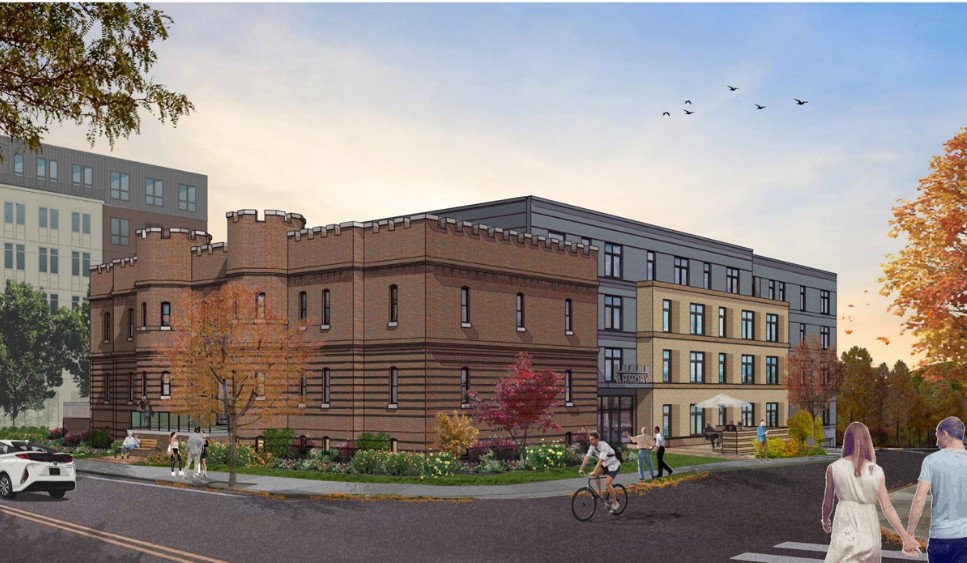
What This Means for Buyers & Sellers
For Buyers:
-
You’re buying into a premium village — expect above-average pricing compared to many suburbs, but also expect strong underlying fundamentals (schools, commute, character).
-
Be prepared for competition and relatively quick turnaround (e.g., 20 days on market in some cases). Time matters.
-
Because many homes are older and have historic elements, factor in potential update/maintenance costs (roof, windows, systems, preservation/regulation issues).
-
Value drivers: village walkability, proximity to commuter rail, access to amenities, historic charm, and strong school district. Use these when evaluating homes (or instructing clients to look for these attributes).
-
Potential trade-offs: Smaller lot or less update might yield better value; condition and systems will matter more given price point.
For Sellers:
-
You’re in a strong market niche: Homes in West Newton with good location, condition and presentation can perform very well, particularly in the prestigious West Newton Hill
-
Emphasize the unique selling points: village center location, historic homes, walkability, transit and high-quality schools.
-
Prioritize home presentation: Because buyers are paying premium, condition, update-status and aesthetics matter significantly. Investing in staging, minor updates or fresh landscaping can yield strong ROI.
In Summary
West Newton offers a compelling proposition: a charming, historic village with authentic character, high-caliber schools and community, strong transit and commute options, and homes that command premium value. For buyers, it means living where lifestyle and location converge; for sellers, it means leveraging those strengths to achieve a strong result. As a real-estate broker working in this area, your messaging should highlight those unique village attributes while also setting realistic expectations about competition, pricing and condition. In a market defined by premium pricing + high demand + limited inventory, your value as a guide and strategist is particularly important.
Related Links
- West Newton on Wikipedia
-
West Newton Hill Preservation – information about historic district and preservation in West Newton Hill.
-
City of Newton – Historic Newton: West Newton – official village history page.
- West Newton Historic District on Wikipedia
This content is currently unavailable. Please check back later or contact the site's support team for more information.

